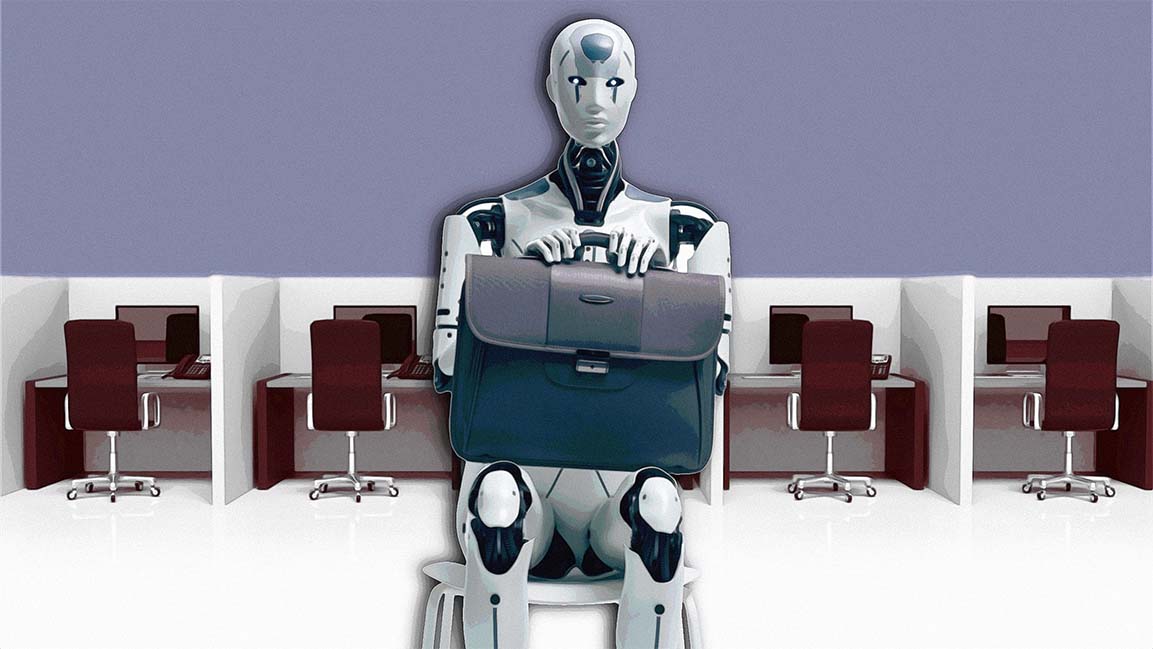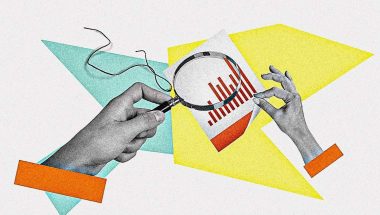- | 9:00 am
Professionals in the Middle East risk losing their jobs to AI. Here’s how they can avoid it
Whether you’re starting out or a mid-career professional, you should upskill to ensure you’re in front of the pack

Kunal Harisinghani has just finished a course in prompt engineering for artificial intelligence (AI) platforms. The marketing professional feels the self-paced course will add to his skills at a time when new technologies are transforming his field. Prompt engineering is a new field in AI; professionals write succinct directives so applications can generate the desired results.
“I remember we were learning Facebook business management and advertising a little over a decade ago. Now that has evolved into a multi-billion-dollar industry. Similarly, AI is a tool that will impact all aspects of the business from the perspective of how things are done,” he says.
Harisinghani likens the transformation to the move from typewriters to computers. “AI will augment and scale [every field] faster than ever before. If you don’t get used to using AI as people got used to using Windows or Excel back in the 90s, you are bound to miss out on a revolutionary productivity scale,” he adds.
Upskilling or reskilling will be essential to career progression and perhaps even keeping our jobs as AI and other technologies become central to creating business value. Recent months have seen a flurry of tools launched that almost instantly generate text, pictures, videos, and other types of content from a few words, inspiring doomsayers to predict that our jobs could soon be taken by one or other kind of AI.
The AI chatbot ChatGPT is perhaps the most popular of these tools, clocking over 100 million users from November to February.
SURGE IN AI-LINKED JOB SEARCHES
Careers platform LinkedIn has seen jobs mentioning GPT surge over 50% over the past 12 months, said Suzanne Duke, the platform’s Head of the Global Public Policy and Economic Graph Team, at last month’s World Economic Forum (WEF) Growth Summit.
The WEF forecasts that 23% of jobs will be disrupted over the next five years on the back of technologies such as AI, as well as through the expanding green transition and supply chain changes, Managing Director Saadia Zahidi said.
The Forum’s biannual Future of Jobs report estimates that 83 million roles will disappear between 2023 and 2027, while only 69 million new ones will emerge, a net loss of 14 million jobs.
For its part, AI could expand employment. While some 75% of surveyed companies will likely bring AI into the workplace, about half (50%) of organizations expect the technology to create job growth, and 25% see it leading to job losses, the report said.
FREQUENT CAREER PIVOTS TO BECOME NORMAL
Therefore, workers looking to cash in on that growth must focus on upskilling and reskilling.
“Everyone will need to become a bit more comfortable with more frequent pivots as business, market, and even societal conditions change,” said futurist Alexandra Levit, co-author of Deep Talent, a recent book about how AI can help companies transform their organization and empower employees.
“Everyone who wants to be gainfully employed for the next 10-20 years should be thinking about how their job could be automated in the near future and consider the adjacent skills that probably won’t be automated – assuming they don’t want to change careers entirely,” she said.
In her case, ChatGPT will likely be able to write her column within five years. “However, I doubt my media outlets will allow that column to go out without a human pair of eyes on it. So, I must now become equally proficient in editing,” she said.
“All mid-career professionals should research to determine which AI programs are used in their fields and become familiar with how to work with these – before their organizations require it. The specific tools will vary depending on your industry and role, but you want to be out in front,” she added.
RESKILL WITH AN AI-FOCUSED COURSE
For those looking to reskill in AI or machine learning (ML) without taking a break for a full-time degree, there are several ways to do so in the UAE with credentials-based courses – offline, online, and hybrid formats.
The US-based SANS Institute, for example, has a course dedicated to the widely used Python language, so students learn how to automate information security tasks. Separately, its SEC595: Applied Data Science and Machine Learning for Cybersecurity Professionals covers ML algorithms and natural language processing and provides hands-on experience using popular libraries.
“By taking these courses, mid-career professionals can gain the skills they need to excel in various fields, including AI, ML, and security/IT sectors,” says David Hoelzer, SANS Fellow.
Besides foundational knowledge such as programming languages, machine learning, and AI techniques, he recommends considering certificates in data analysis and visualization, AI ethics and security, and domain-specific applications such as AI for healthcare, finance, marketing, or cybersecurity.
The learning platform Coursera is one place to find these certificates. The Polytechnic University of Milan takes you through the fundamentals of trustworthy AI for healthcare management in three hours. Sweden’s Lund University covers AI’s ethical and societal aspects over four part-time weekly modules.
CONFIRMED JOBS FOR 63% OF AI GRADUATES
But for those who want to go to school, AI has been a subject in educational curricula in the Middle East for several years.
In February, the inaugural batch of 52 students from 24 countries received post-graduate degrees in the key AI fields of computer vision and machine learning from the UAE’s Mohamed bin Zayed University of Artificial Intelligence (MBZUAI).
About 63% of this first class graduated with confirmed employment, Ph.D. placements, paid internships, or plans for start-ups, the university said in a statement.
As AI makes inroads into traditional business sectors, roles such as basic customer service functions are already being replaced by AI chatbots, a trend only likely to accelerate, according to the WEF.
“Graduates with academic and practical experience in AI can make a difference across many fields, including education, biology, chemistry, physics, and manufacturing. They need this understanding to grasp the challenges and devise AI-based solutions that can help solve problems and enable various sectors to operate smarter and more efficiently,” says Professor Kun Zhang, Deputy Department Chair of Machine Learning, Associate Professor of Machine Learning, and Director of Center for Integrative Artificial Intelligence (CIAI) at the MBZUAI.
“In biotech, for example, AI can learn from rich data and reason like human experts, but much more powerfully. In this way, AI enhances complex processes such as gene sequencing or understanding protein structures,” he adds. “AI will likely help transform domains including psychology, physics, finance, farming, and energy.”
Ning Sun, a first-year Ph.D. student at MBZUAI who hopes to become a drug design and development researcher, views AI as a career field that echoes a deep sense of purpose and practical considerations.
“A career in AI can offer individuals numerous opportunities for growth, innovation, and impactful work,” Ning says. “Individuals pursuing a career in AI can significantly impact society. Furthermore, due to the high demand for skilled AI professionals, individuals can enjoy job security and attractive salaries.”
AI ISN’T LEADING TO MASS EMPLOYMENT YET
For now, experts don’t think AI is replacing human beings entirely. Rather, because AI apps can analyze vast amounts of data, identify patterns, and make predictions faster and more accurately than humans, experts agree that AI should be seen as a tool that complements human abilities, leading to more efficient and effective outcomes.
“While there are jobs that will rely less on AI than others, the picture is nuanced as AI can help with certain tasks in some jobs, not necessarily all tasks,” says Stephen Gill, Academic Head of the School of Mathematical and Computer Sciences, Heriot-Watt University Dubai. The university offers AI, network security, cyber security, software engineering, and computer game programming degrees.
For example, AI won’t replace oncologists. Instead, he says it’ll detect cancer earlier, leading to better diagnoses. Similarly, while AI programs can help with content writing and storytelling, they will have difficulty emulating the high creativity required. “Therefore, while the use of AI will vary in different jobs, AI might help with certain functions in jobs, but not necessarily replace core functions.”
MBZUAI’s Zhang, too, believes human judgment, creativity, and ethical reasoning will remain crucial for decision-making in complex and nuanced situations.
“There are many skills that AI systems lack but are vital for success in many roles – empathy and the ability to inspire and motivate others,” he says. “For instance, the best teachers inspire their students to be creative while instilling a love of learning. Skills including creative thinking and self-reflection will be in demand.”
FOCUS ON THE HUMAN ASPECTS OF YOUR ROLE
Jadd Elliot Dib is the Founder & CEO of Pangaea X, a recruitment platform for data analytics freelancers. At every level, pursuing courses in machine learning, data analytics, and programming languages such as Python and R can help build proficiency in AI-related technologies, he says.
But if you think you can’t make it in AI, don’t fret – focus on the more “human” aspects instead. He advises developing critical thinking, problem-solving, and creativity skills for a well-rounded approach to applying AI in their respective fields. “With AI-powered solutions becoming increasingly prevalent, it is essential for professionals across all sectors to embrace this know-how and adapt to its integration in their work processes.”
Overall, there seems to be room for people who want to specialize in AI and related fields such as ML, programming, and data analytics and those who simply want to use these evolving disciplines to do their jobs better. With the WEF predicting that roles such as bank tellers, administrative assistants, and secretaries could disappear entirely, creative thinking and upskilling are now essential to getting ahead.







































